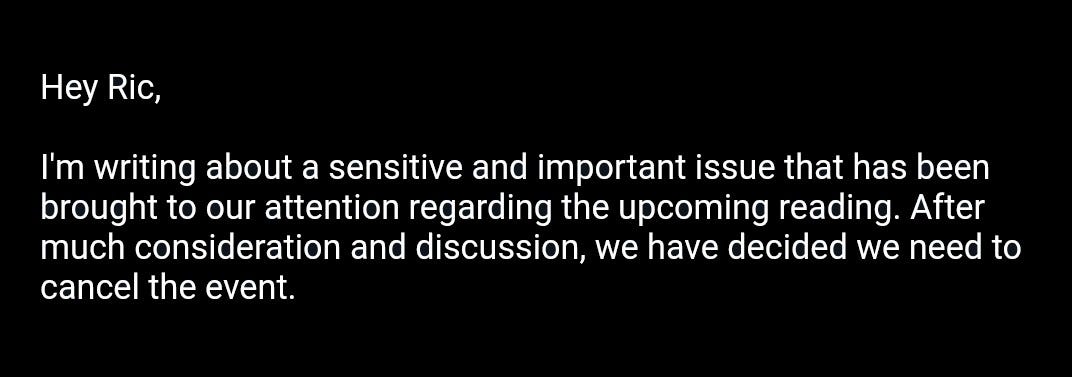This is the email I received from the bookstore yesterday. They received an email in regards to my upcoming reading, they didn’t say who it was from, only that it brought attention to accusations from my past. In addition to the what I included in the screenshot, they added a paragraph justifying their decision to cancel my reading based on policy, a decision they said was “not easy to make.”
I was really unsure about this whole Substack thing at first, I hadn’t had an incident like this in 2 maybe 3 years, I didn’t want to make being a pariah part of my identity more than it already is. But a moment like this confirms an unfortunate conclusion: this Substack is necessary.
My response to the email was brief, just pointing out how the decision that they said was hard to make, should have been even harder. So hard in fact that they may have asked others to weigh in with their perspectives, namely the person being accused (me), or the other woman who was on the bill with me (who knows my situation very intimately), or the woman who set up the event (a close friend). But no, an email from a stranger is good enough.
As for the email, they didn’t say who sent it, and I’m not even sure they know. The last time I’m aware of an email like this being sent out, it was sent directly to my partner. Sent through a third-party app that conceals the sender’s identity and bounces the IP address to a random place in easter Europe. There wasn’t even a way for my partner to respond. So brave.
But what else could the bookstore do? If they continued with the event after getting that email, they might have had a social media shitstorm on their hands. So can you blame them? Yes, I can. And I do. Every venue that does not practice due diligence in these situations is not doing the hard, important work they think they are doing. Imagine the rush a person can get knowing that at a push of a button, they can watch opportunities disappear for people they don’t like or disagree with. That is some power. And that reservoir of power is fed every time a venue makes these “hard decisions.” Reading an email and deleting an event from your calendar ain’t hard. Getting people in a room together to have discussions about these situations, to make sure you determine exactly who has power in the situation, to determine whether the accusations are even valid, to see whether you want to contribute to an an endless, absurd sentencing for no crime at all. That all sounds a little harder. Venues and institutions who do not do this work are the testing grounds where modern monsters as “the cyberbully” and “the crybully” get to test their wings.
As you can tell, I’m breaking from my usual zen approach to all this. Because right now it hurts and I am angry. But after giving myself some time to feel it, I will be right back booking events. My advice for those with a person or people trying to get your events shutdown: Book more events, exhaust them.

